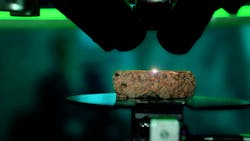CES 2025: ABLASCAN Super Scanner Identifies Atoms at Speed of Light
ABLASCAN is the first intelligent LIBS microscope capable of reliably and automatically revealing materials' atomic composition in milliseconds. This customizable, plug-and-play microscope democratizes cutting-edge laser technology to meet the needs of laboratories and industries across the entire material lifecycle.
LIBS is an entirely optical analysis technique that reveals the chemical composition of any material (solid, liquid, or gas) in just a few milliseconds. Its principle involves focusing a brief laser pulse to sample a fraction of material, forming a plasma. The optical emissions from this plasma are analyzed to detect, identify, map, and quantify the material’s chemical elements.
Users don't need to be a chemist, physicist, or data processing expert. Using AI, the microscope accelerates and automates the chemical analysis of materials at the microscopic level. It delivers analysis speeds up to 10x faster than conventional LIBS equipment, performing 1 million chemical measurements in just 15 minutes compared to 3 to 15 hours using traditional techniques.
Its unique specifications rely on advanced algorithms developed by ABLATOM, which automatically identify a material's chemical elements with unparalleled accuracy, even detecting traces previously invisible to conventional technologies. In just minutes, any operator can obtain a qualitative and quantitative analysis report, including optical images and detailed chemical maps of the material.
ABLASCAN addresses two fundamental needs:
- Labs: An open tool that expands scientific exploration and accelerates the discovery and development of new material properties.
- Industries: A fast, ergonomic solution deployable directly on-site, eliminating the lengthy and costly processes of traditional lab-based analysis.
This innovation opens new avenues for exploration, scanning large surfaces (for instance, 200 cm²) in a single sequence while maintaining micrometric resolution under ambient temperature and pressure conditions. Versatile and adaptable, it can be used for a wide range of materials—metals, plastics, ceramics, glass, and rocks—throughout their lifecycle, from extraction to recycling.
This technology enables resource tracking in ores, maps lithium distribution in batteries, identifies metal fragility in nuclear applications, and ensures the quality control of strategic metals in recycled waste streams.
Features:
- Sampling, excitation, and detection in a single process
- Instant chemical composition analysis
- Detection of all periodic table elements, including light elements
- Large surface mapping at micrometric resolution
ABLATOM
Lyon, France
+33 (0)4 81 91 20 26
[email protected]
ablatom.com
